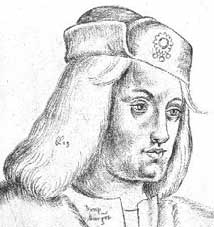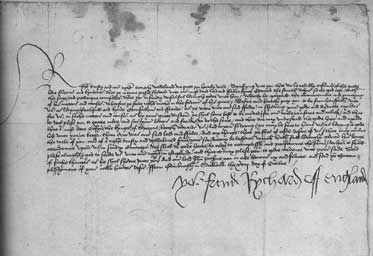 |
Patrick Delaforce'The Delaforce Family History' - Chapter 23
|
Chapter 23
"St. John Companion in tribulation"
Sir Anthony de La Force and
Perkin Warbeck, the Pretender
|
Anthony, the younger son of Sir Bernard and brother to Peter/Pierre the goldsmith who lived in Canterbury, was born in the Auvergne in 1475.
Although we will continue to refer to "Perkin Warbeck" in this chapter because of the familiarity of the name, it is important to note that this usage originated from the propaganda of Henry VII & has no validity. Such is the power of the winners to distort historical memory. One theory is that Anthony was linked to Perkin Warbeck at a very early age so that the latter's knowledge of English and of Court life should be improved. Anthony's father had first hand knowledge of four English and two Spanish sovereigns, and courts in London and Madrid. Much of this must have affected Anthony so that by the age of 9 or 10 he would have been a courtier himself with basic skills of diplomacy. This may sound incredible now, but men matured very early in life during the Middle Ages! The records show clearly that Anthony was with Warbeck in Flanders, France and Scotland. It is perfectly possible that he accompanied Warbeck to Portugal, Austria and Ireland as well. Warbeck went to Lisbon for the signing of "Richard's Treaty" in June 1484. Anthony's father, Sir Bernard, was still English Ambassador, to the Spanish Court and may possibly have advised the two young men on their diplomatic mission to Portugal. In 1491 Warbeck made his first visit to Cork. In 1492 he went with Anthony to see Charles VIII, King of France, in Paris regarding his quarrel with Henry VII of England. The Treaty of Etaples forced Warbeck to leave France. After many adventures they then returned to the court of Marguerite, Duchess of Burgundy, in the Low Counties. Anthony's grandfather Bernard, Lord De La Force, who was killed at the battle of Barnet on April 14th 1471 (see chapter 25), almost certainly started his fatal last venture from the Burgundian court in Flanders. Anthony was certainly there at Deldermond in 1493 when both young men were being looked after by the Governor, Hugh de Melun, a Knight of the Golden Fleece. Margaret, the Dowager Duchess of Burgundy, accepted Warbeck as her nephew, and set about educating him as a Royal Yorkist. Anthony might have gone with Warbeck to Innsbruck in 1494 to see Emperor Maximilian who recognised him as Richard IV. Warbeck's second visit to Cork took place in July 1495, and Anthony may have fought in the various small battles and skirmishes in the Warbeck uprising.
In 1497 Warbeck was captured and remained in London until 1499 when he and the Earl of Warwick were hanged. He had tried to escape in 1498 but was recaptured. The Duchess of Burgundy made strenuous efforts to save Warbeck - but in vain. Sir George Neville fled to her court in the Low Countries in exile. On 17th Aug 1498 the Bishop Elect of Astorga wrote to King Ferdinand and Queen Isabella "The King of France (Charles VIII) has presented to the Flemish Commissioners the following sums of money. The Count of Nassau 300 Marcs, to the president of Flanders 60 Marcs and to (Anthony) M De Fores 50 Marcs and the Secretary 40 Marcs. They are very well satisfied with the King of France". Spanish State Papers. Anthony's father Sir Bernard had retired to the family town and home of Fourcès in Gascony in 1492 for a variety of reasons... He might have been ashamed of Anthony's escapades. He was wealthy from his trading, loaded with honours and wanted to re-establish roots in Gascony, having purchased a third of the family town! For a time after Warbeck's death Anthony may have lived in Gascony or the Gironde. During 1498-1501 Anthony Delafont, of Realmont (Montreal near Fourcès) was trading with many cargoes from Bordeaux to London, this sounds like Anthony, backed by his father living in Fourcès, shipping cargoes, probably of wines to England. In 1502 Gallia Christiana records "Antonius I de Feurs deu de Fours conciliarius (councillor) in Parlamento Parisiensi & Archideacanus Matisconensis, competitorem habuit & summovit Jacobum (James) de La Font quem modo ominavimus. Praerat adhuc anno 1502. Ecclesiae Carnotentsis". In 1505, 6 and 7 Antoine de Feurs or Fours was shown in GC Book 12 p.655 as father of "Johannis de Feurs in Matisconsensis territorro, filius Antonius protonotarius (first chief notary) apostolicus prior d'Iregny, abbas Sancti Leonardi Ferrarensis, praefes (magistrate) concile inquisitionem in parlemento Parisiensi, major archidiacnos Nannetenois & Lugdunensis decanus, (deacon) episcopus Nivernonsis Mai 1505 in regestis Vaticani. Regi fidem juravit Blefis 8 Feb. 15051617. (Vatican Records). (Note 9-4-2000 Patrick tells me he is not entirely happy with the two paragraphs italicised above. If anyone has any further information, would they please e-mail me with it. Ken) Anthony, aged 27, was now a responsible member of the French government in the Paris parlement with his sons James and John about to follow him. He had also been awarded church titles. He was elected to the Paris parliament of Charles VIII in 1495. In 1503 he was re-elected "des six conseilleurs elus, les deux plus favorisee Anthoine de Feurs seu Fours par 49 voix..." He was a Clerc or Magistrate, "docteur in utroque" archdeacon of Macon (in Burgundy) in 1504, made Bishop of Paris and later became the 85th Bishop of Nevers in 1507. (Source Maugis Hist. de Parlement de Paris, book 3). About 1504 Anthony, now knighted and presumably totally forgiven by King Henry VII for his activities with Warbeck - which originally could certainly have been construed as treachery - was involved in a legal case in London. Early Chancery proceedings vol.3 p.173 (C1132155), 1485-1500. "Sir Anthony Delaforce petitions the Archbishop of Canterbury, Chancellor of England". "Sir Anthony and Laurence Walgrave of Conventry were jointly and severally bound by simple obligation to John Unfrey for £6 owed to him by Laurence, which obligation was delivered to John Woodward of Coventry to be safely kept, to the intent that if Laurence allowed Unfrey to occupy a house belonging to L. of the annual value of 40s, for 3 years without paying rent the obligation should be regarded as void at the end of the 3 years. This time has passed but Unfrey is demanding the £6 against Anthony before the Sheriff of London. As the bond is 'simple' (not made under seal) he has no remedy unless the Chancellor directs the Sheriff to transfer the case to Chancery there to be ruled as right and conscience shall require". Sir Anthony was presumably living in London at the time because the case was before the Sheriff of London. Before we leave the saga of Anthony and Perkin Warbeck there is a fascinating but garbled story from one of the contemporary French historians. The Memoires de Comines vol.V p.172 recounts (translated) "Le Comte de Dammartin had acquired the titles of Comte d'Aumale and York from the French King Phillipe Auguste (way back in the 13th century when William de Force was Earl of Albermarle). His ancestor fell into disgrace at the Court and with 'le cabinet du Roy Louis XI'. He followed the Court to Bordeaux, but in vain. The King sent him back to Germany without any friends except a Yeoman Farmer of Dammartin in Normandy named Anthoine le Fort with whom he returned where he was nurtured well for a long time with his son, god-child of the Duke de Bourbon (Armagnac)." Louis XI reigned from 1461. Comines had got the salient features right. A "Duke of York" supported by his close friend Anthony de la Force solicited the King of France for favours. They did both leave France for Austria in 1492 (not Germany). Obviously the story of Warbeck (Duke of York) and Anthony was now enshrined in French folklore as an example of friendship. As a Delaforce, one should be pleased that the family's side won the Battle of Barnet but, from the rationalist viewpoint, be pleased that a good king, Richard III (to whom we owe some basic human rights), lost Bosworth, as Henry VII (an excellent administrator, one must admit, although he had no right to the throne) lead to Henry VIII, who, by the happy accident of fathering daughters, saved England from Catholicism. However, controversy still reigns regarding both battles. There were rumours, partly fuelled by strenuous royal propaganda against them, that Edward IV was not the son of his ‘father’, Richard, Duke of York. Recently (in 2004), Dr. Michael Jones found the evidence, which had been lying in the public domain in the Rouen Cathedral register, for 560 years, that Richard could not possibly have begotten Edward, as he was away fighting in France at the time. While Richard III was a legitimate king, he was the last, as the present royal family claims its legitimacy from Edward IV’s daughter, Elizabeth, who married Henry VII. The legitimate English monarch thus becomes Michael Plantagenet Hastings, a rice farmer in Australia, who voted for a republic in the referendum. There is more about the Battle of Barnet in chapter 25. The Battle of Bosworth is still controversial because no one is sure as yet, where it was fought. Richard intended to win it by a spectacular cavalry charge, emulating the Battle of Toro, where his allies, Ferdinand & Isabella established her right to rule Castile, but the ground round the present Visitors Centre is totally unsuitable for such a manoevre. An experienced general such as Richard would have chosen his ground with care. |
|
Sir Anthony DELAFORCE (1470 - 1510) also spelt De Fours & Feurs Bishop of Paris, Nevers, Member of Paris Parlement back to his father in chapter 24 = (1488) ?
|
|
Contact: Ken Baldry for more information, 17 Gerrard Road, Islington, London N1 8AY +44(0)20 7359 6294 but best to e-mail him |

